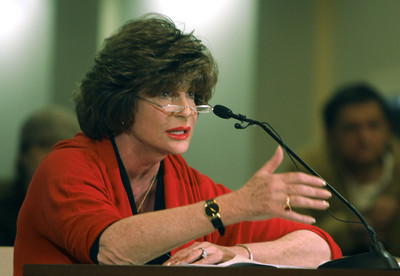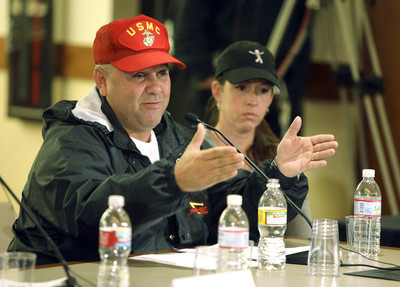Valley residents air financial trials
Nevadans told members of a congressional panel Tuesday that the $700 billion Wall Street bailout has not filtered down to help the victims of the current economic crisis in one of the nation's hardest hit areas.
With nearly $350 billion already out the door, credit has not loosened and the pressure of unemployment and foreclosure has not abated for everyday Americans suffering the effects of the recession, experts, officials, business representatives, nonprofits and local residents told the panel, created by Congress to monitor the bailout monies it authorized in October.
The big banks who are getting the money "all have the same answer: 'We're working on it,'" Senate Majority Leader Harry Reid, D-Nev., told the panel. "Well, I would suggest they get a new work crew because it's not helping at all."
Congress wanted the money in the Troubled Asset Relief Program used to open up lending and stem foreclosures, but that hasn't happened, Reid said.
Tuesday's event was the first field hearing of the 3-week-old Congressional Oversight Panel, chaired by Harvard law professor Elizabeth Warren. Las Vegas was chosen, according to the hearing schedule, because of its status as "Ground Zero of the Housing and Financial Crises."
The grim tales recounted before the panel Tuesday morning wouldn't have been news to most Las Vegans: jobs disappearing, families losing their homes, development halted, neighborhoods and casinos alike emptying out with devastating effects.
But to the panelists, it was a chance to see firsthand the real-world conditions at the heart of a bloodless Washington policy debate.
Nevada has led the nation in foreclosures for nearly two years; by the end of 2008, Clark County is expected to see 30,000 foreclosures. Unemployment in the state is at a 25-year high, about 1 percentage point above the national level, and is likely to hit 10 percent in 2009, Keith Schwer, director of the Center for Business and Economic Research at UNLV, told the panel.
"Our country is in peril," Warren said. "Taxpayer dollars are flowing into banks, but there is little evidence of what effect these hundreds of billions of dollars are having on the very obvious troubles facing us: mortgage foreclosures, restricted small-business lending and rising unemployment. We are here to learn from you and to take what you tell us back to Washington."
The other two panelists in attendance were Richard Neiman, New York state's superintendent of banks, and Damon Silvers, associate general counsel for the national AFL-CIO labor union. A fourth panel member, Rep. Jeb Hensarling, R-Texas, did not attend.
Fundamental questions need to be asked about the bailout that was rushed through Congress with little built-in oversight, Silvers said, and "these questions cannot be answered through a dialogue among Washington insiders.
"They must be the subject of a national conversation, a conversation that starts off with what is actually happening in our communities, communities like yours. Can business people borrow money to run their firms? Are foreclosures getting better or worse? Are employers hiring or laying off workers? Are local financial institutions being fairly treated by the federal government?"
Those questions were universally answered in the negative by the Nevadans selected in advance to testify before the panel, including local resident Alfred Estrada.
An out-of-work driver, Estrada bought his "dream house" for his family of four, then fell behind on his payments. Wanting to stay in the house, he tried to arrange a short sale to a friend who would allow him to rent it after it sold. The plan seemed to be proceeding until one day he was suddenly informed that the bank had sold the house at auction.
The house had been sold for $13,000 less than his friend was willing to pay, Estrada said. He was told he had 14 days to leave with his wife and two daughters.
"We had the money to buy the house. It wasn't supposed to go into foreclosure," he said, clad in a Marine Corps ball cap and In-N-Out Burger logo jacket, his wife weeping silently at his side. "But they sold it at auction for a reduced price. I have no idea why."
Gail Burks, president of Nevada Fair Housing, a nonprofit housing assistance group, said it is often the case that people facing foreclosure can't communicate with their lenders or can't reach the people who have the power to change their loan terms. She recommended making it mandatory rather than optional for lenders to attempt to renegotiate defaulted mortgages.
Rep. Shelley Berkley, D-Nev., was blistering in her assessment of the bailout plan, noting that her initial misgivings prompted her to vote against it the first time it came before the House of Representatives. She voted for it the second time it was introduced, she said, only because she became convinced something, however imperfect, had to be done immediately.
Hundreds of billions of dollars, Berkley said, has gone "to prop up Wall Street banks and investment companies, but little to help people in Las Vegas who are losing their homes."
She also was skeptical there was much the toothless panel could do to help. "This is after the fact. The money is gone," Berkley said.
Policy proposals such as a public infrastructure stimulus package, energy legislation and health-care reform will get to the roots of the country's economic problems, she said. But it would also help if communication between borrowers and banks improved; the Federal Deposit Insurance Corporation did not overcompensate for past failures by overtightening credit; and reforms addressed naked short selling and the use of "mark-to-market" accounting.
The message Washington needs to hear, Berkley said, is this: "Our community is hurting, and we could use some help."
In an interview after the hearing concluded, Warren said she was struck by the disconnect between regular people and the big banking companies. "There was no evidence today that the money is making it past the top levels of the financial institutions," she said. "People are deeply frustrated. They worked hard and played by the rules, and now they can't find anyone to talk to."
The Treasury Department has a lot of leeway in how it administers the bailout program, Warren said, and does not appear to have the right priorities. The foreclosure crisis is the front line of the economic battle but Treasury is "clearly not focused on this area," she said.
"If Treasury cannot devise programs that are moving that money into the economy, then they have failed in their statutory obligations," she said.
Contact reporter Molly Ball at mball@reviewjournal.com or 702-387-2919.
Slideshow























